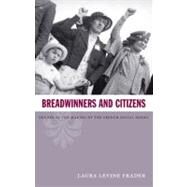Breadwinners and Citizens
, by Frader, Laura Levine- ISBN: 9780822341987 | 0822341980
- Cover: Paperback
- Copyright: 4/30/2008
Laura Levine Frader's synthesis of labour history and gender history brings to the fore failures in the realization of the French social model of equality for all citizens. Challenging previous scholarship, she argues that the male breadwinner ideal was stronger in France in the interwar years than scholars have typically recognized, and that it had negative consequences for women's claims to the full benefits of citizenship. She describes how ideas about masculinity, femininity, family, and work affected post-World War I reconstruction, policies designed to address France's post-war population deficit, and efforts to redefine citizenship in the 1920s and 1930s. She demonstrates that gender divisions and the male breadwinner ideal were reaffirmed through the practices and policies of employers, organized labour, and the state itself. The social model that France implemented in the 1920s and 1930s incorporated fundamental social inequalities. Frader's analysis moves between the everyday lives of ordinary working women and men and the actions of national policymakers, political parties, and political movements, including feminists, pro-natalists, and trade unionists. She explains how, following World War I, the many women and increasing number of immigrant men in the labour force were pitted against one another in competition for employment and pay. Family policy was used not only to encourage reproduction but also to regulate wages and the size of the workforce. Policies to promote married women's and immigrants' departure from the labour force were more common when jobs were scarce, as they were during the Depression. Frader contends that gender and ethnicity exerted a powerful and unacknowledged influence on French social policy in the Depression era and for decades afterward.







